
*
"Sunrise, sunset / Swiftly fly the years." And suddenly the man who wrote these words has amassed 88 of them and spent 60 of those writing lyrics for Broadway.
Sheldon Harnick will be saluted as such July 28 at The Paley Center for Media in the only manner the small-screen medium can muster — tapes of the only musicals he and his longtime composer, Jerry Bock, had on TV: "The Canterville Ghost," written for TV (at 2 PM), and "She Loves Me," adapted by the BBC from their 1963 Broadway show (at 4 PM). "I can't remember any other show I wrote for television," Harnick says. "Everything I've done has been for the theatre."
Well, not all his rhymes come with music. A conspicuous, and very current, case in point is "The Outdoor Museum (Not Your Usual Images of New York)," where his words introduce 11 different arrangements of shots-about-town, all of them photographed by Margery Gray, his actress-wife who previously decorated his Tenderloin and Fiorello! and spiced both with her quirky comedy.
The notion of Bock and Harnick's entire television history passing in front of his eyes in a single afternoon is greeted as a very differentiated mixed-blessing for the lyricist. He has fond memories of the TLC which the BBC lavished on "She Loves Me" (a version of the 1963 Broadway charm show that served the world "Ice Cream") and less than that for the Oscar Wilde-inspired "The Canterville Ghost," which was also taped in England (at a 13th-century castle in Kent, near London) — but by visiting Americans.
| |
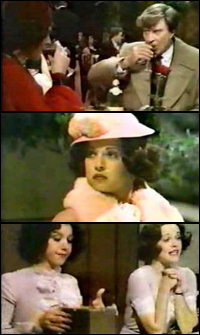 |
|
| Top: Gemma Craven and Robin Ellis, Middle: Gemma Craven, Bottom: Diane Langton and Gemma Craven in "She Loves Me" | ||
| photo courtesy of The Paley Center for Media |
Then, again — given the non-singers assigned to the musical — some of the voices were better left unheard. "The casting was off, except for Peter Noone from the British vocal group, Herman's Hermits — he was charming — and Michael Redgrave was wonderful as the ghost and sang the role very well."
Douglas Fairbanks Jr. led the American contingent, which included Natalie Schafer from "Gilligan's Island" as his wife and Tippy Walker from "The World of Henry Orient" as his daughter.
Bill Rudman of Sirius Radio will interview Harnick and take questions from the audience on July 28. "When Bill said they were showing it, I said, 'Oh, dear, do we have to see it?' He said, 'We’ll do a question-and-answer so you can defend yourself.'"
The Canterville Ghost aired Nov. 2, 1966, on the single season of "ABC Stage 67," a very artful prestige series that sailed right over the heads of the masses with classics like Truman Capote's "A Christmas Memory" and Stephen Sondheim's "Evening Primrose." Bock and Harnick's effort was one of several original musicals for television that ABC commissioned. "Burt Bacharach and Hal David did one," Harnick says. "I don't remember the title, but I still remember one musical phrase from it: 'Fender, bender / Bend my guitar.'" [Their show was titled "On the Flip Side."]
| |
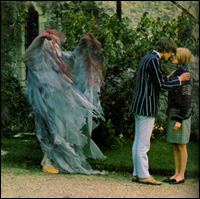 |
|
| Michael Redgrave as the Ghost, with Peter Noone and Tippy Walker in "The Canterville Ghost." | ||
| photo courtesy of The Paley Center for Media |
He estimates he has gone through "eight or ten composers, maybe more" in his lifetime, counting himself, and now acutely including himself for a couple of new works-in-progress (The Doctor in Spite of Himself and Dragons).
An early brush with established lyricist E.Y. Harburg helped change his game. "I'd written a song for Charlotte Rae to do at The Vanguard, and she told me one night that 'Yip' was coming down. We met, and he invited me to come over to his house to play for him. Most of what I played was college stuff, but he was very encouraging, and he said, 'Let me give you a piece of advice: In your comedy songs, your verses are like recitatives. It's like you want to set it up and get to the chorus. Don't do that. When a person hears a comedy song, if it's funny, the first time they hear it they will laugh. The second time they hear it, they know the joke. They ain't gonna laugh. What gives the song legs is the music, so every part of that song has to be as good musically as you can make it.'" Thus, the eight-to-ten — maybe-more collaborators in his career.
For all his Fiddlers and Fiorelloes, Harnick hit his share of potholes on The Great White Way, especially early on when he was still "loning it." His most colorful, funny-on-reflection pit-stops? Portofino and Shangri-La.
| |
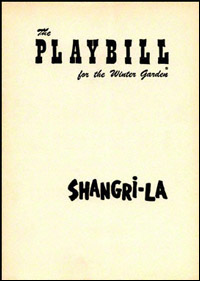 |
|
| The Playbill for Shangri-La |
"Alice Ghostley had a showstopper in it, too. It was peculiar because I could never quite hear the lyric. The director said, 'Alice, they can't hear the lyrics. I'm going to sit you down and you're going to sing it. It'll be even stronger because they can hear the lyrics.' Alice said, 'If they hear the lyrics, it won't work. The reason I'm doing what I'm doing — whirling around, jumping, craziness — is because it's a terrible song.' He said, 'No. Trust me.' Those words. He sat her down. She did the song. It died. She went to the producers and said, 'Either let me do this the way I was doing it, or you have my notice,' so they let her do it her way. He was a terrible director."
| |
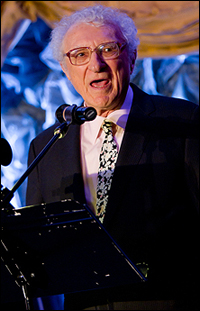 |
|
| Sheldon Harnick | ||
| Photo by Krissie Fullerton |
"Something he said at our first meeting made me very nervous," Harnick recalls. "He said, 'I know right now I have to take my ego and rip it out by the roots. Write whatever you like. It'll be great.' So I went to work. Two days before the opening, he called the company on stage and said he'd changed his mind. 'We're going back to my lyrics. You're not going to do any of Mr. Harnick's work.'" Harnick said nay to Ney, pointing out that the leading man was French (Georges Guetary of "An American in Paris" fame) and had, at best, a tentative grasp of English so his lyrics stayed. "But one poor girl, in her Broadway debut, started her song with his lyrics, slipped into mine and started improvising words that made no sense at all.
"There was a movie 'star' in that show — Robert Strauss — who was so arrogant that the company hated him. At our opening-night party, the first review that came out — I think it was Walter Kerr's — said, 'Robert Strauss is twice as bad as everybody else because he is playing a double role,' and a cheer went up from the whole company."
Then there was a Harnick show that never got to town: The Amazing Adele. "It had a book by Anita Loos, and a score by Albert Selden. The star was Tammy Grimes. I wrote her an opening number so she could stop the show with it in her hometown, Boston. I wrote some other things, but it didn't help. While we were still in Boston, Selden called a meeting and said, 'I regret to tell you this, but we're not going to New York. I have great faith that all of you will have wonderful — ' By this time, Tammy was on the floor, sobbing, and I went to her and said, 'Tammy, I wish I had as much confidence in my own career as I have in yours.'"
| |
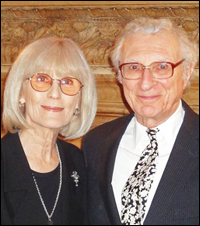 |
|
| Margery Gray and Sheldon Harnick |
The Doctor in Spite of Himself is the second time Harnick has triple-tasked himself (music, lyrics, book) on a full-length musical. His first is based on a Russian play called The Dragon and retitled Dragons. "It has had six college productions, and each time it gets a little better, but there's a problem with it: The man who wrote it [Evgeny Lvovich Shvarts] was anti-Stalin so he wrote oblique plays or he'd never get them produced. He wrote The Dragon as a fairy tale, and the censors passed it, but, as soon as it was produced, they said, 'Uh-oh,' and yanked it down. I'm still trying to figure out how to make the second act comprehensible to American audiences, how to make it mean something to them."
He is also peripherally involved in a musical based on Abigail Pogrebin's first book, "Stars of David: Prominent Jews Talk About Being Jewish," which his nephew, Aaron Harnick, optioned. "Aaron said, 'Read the book. Tell me if there's anyone you'd want to write a song about.' I read the book and said, 'Yeah. One of my heroes is in there: Norman Lear,' so I wrote a song about Norman Lear. He liked it and asked me to do another, so I wrote one on Jerome Groopman, a world-famous oncologist and one of the people who devised the cocktail of drugs which helps AIDS patients live longer.
"Aaron went to every songwriter he could think of and asked for a song and got a show. The book is by Charles Busch, and they'll try it out in Philadelphia this October. I think it's like Working — only this is Jewish, so it's Vorking."
The last new Harnick show to play Broadway played there one night, by design: an Actors' Fund benefit performance of A Wonderful Life, based on Frank Capra's film, "It's a Wonderful Life," and, more aggravatingly, a short story by Philip Van Doren Stern running about nine pages or so called "The Greatest Gift." "The question is: Is the story published or not?" explains Harnick. "He couldn't get it published so what he did was print it up himself as a Christmas card and send it to a lot of friends because that constitutes publication. Every Christmas we have ten or so productions around the country, but we can't bring it into New York because we would have to have a piece of paper in our hands that says that we own the rights."
At this Actors' Fund benefit, the author's daughter met Harnick and told him that she loved the show. "Well, why can't we get the rights to do it on Broadway?" he reasonably asked. She promised to put him in touch with her children who handled that — but she didn't. The estate is famous for shooting off cease-and-desist letters and tried to halt productions at the Westchester Dinner Theatre and the Paper Mill Playhouse. "It's a heartbreaker and a mess, but we can't get it done in New York."
In that Paper Mill production six years ago, playing the only cabbie in Bedford Falls, Harnick spotted a potential Fiorello — Tom Bosleys don't come in bunches like bananas — and the sparkplug-feisty Robert Creighton wound up doing the role four years later at a one-night-only benefit for the American Musicals Project at the New-York Historical Society. His star has since risen (recently he played the purser and understudied Joey Grey in Anything Goes), so he might be ripe for Encores' reprise of Fiorello! Jan. 30-Feb. 3, 2013. That show jumpstarted the series 20 years ago, with Jerry Zaks in the lead. This upcoming version will feature Bock and Harnick's final flourish: a re-thought, character-clarifying new number for Fiorello.
Earlier that month — Jan. 12-14, 2013 — Harnick will lead off the 92nd Street Y's 2013 season of Lyrics & Lyricists, which he has hosted on numerous occasions. "I said, 'Has anyone done one on the daddy of us all, W.S. Gilbert?' They said 'No.' And Rob Fisher [guest artistic director of the event] said, 'We'll not only do one on Gilbert, we'll do one about songs that have been influenced by Gilbert' — for instance, in Pacific Overtures, Stephen Sondheim did a Gilbert and Sullivan patter song." There is another in Thoroughly Modern Millie as well. Hence: "The Very Model of a Modern Major Lyricist: W.S. Gilbert and the Broadway He Inspired."
Harnick is very much the model of a modern major lyricist himself. A year ago, in keeping with the changing times, he altered his lyrics to "Sunrise, Sunset" to make it appropriate for single-sex marriages. "It turned out to be a very simple change, so I did it. The lyric is: 'Is this the little girl I carried, / Is this the little boy at play?' I just changed it to 'Is this the little boy I carried, / Is that the little boy at play?' It was there, that simple. And then, as long as I did that, I did one for women, too.
"I later got an email from one of the guys who got married. It really brought tears to my eyes. He said, 'You have no idea what an emotional experience that was for us.'"
Read more about the career of Sheldon Harnick in the Playbill.com feature Harnick On Harnick.










